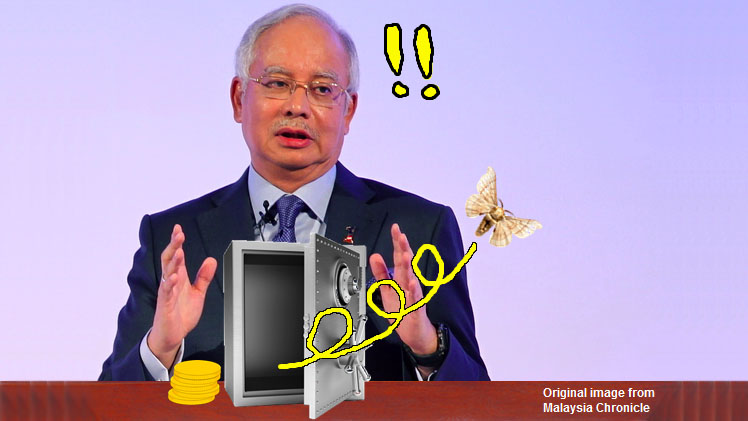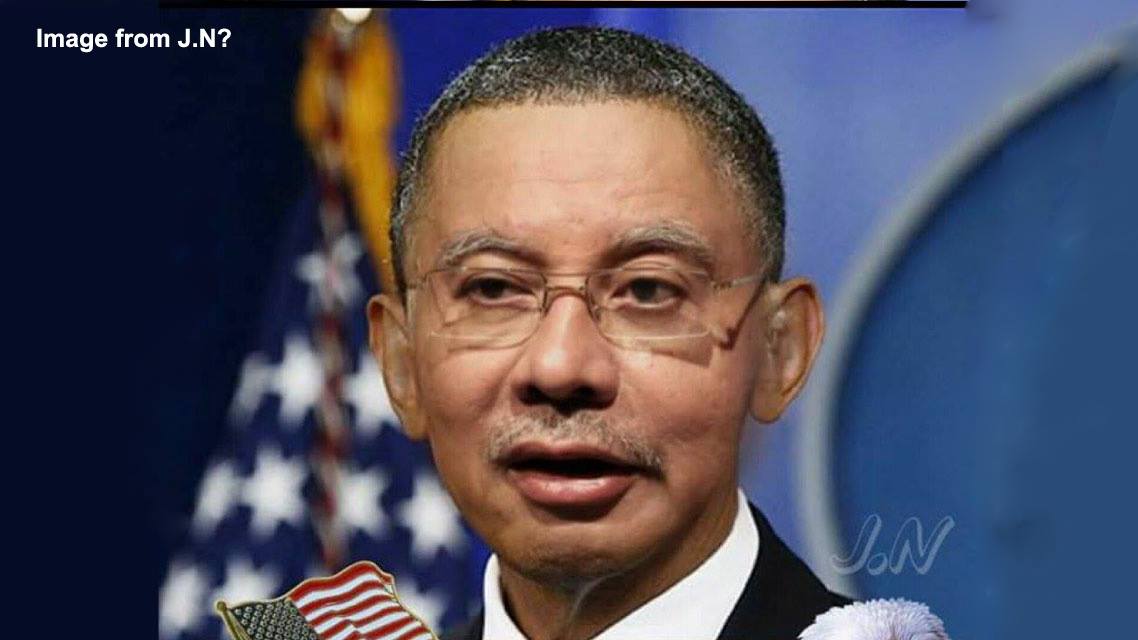How hard is it for a non-Bumiputera to get a job in the Malaysian gomen service?
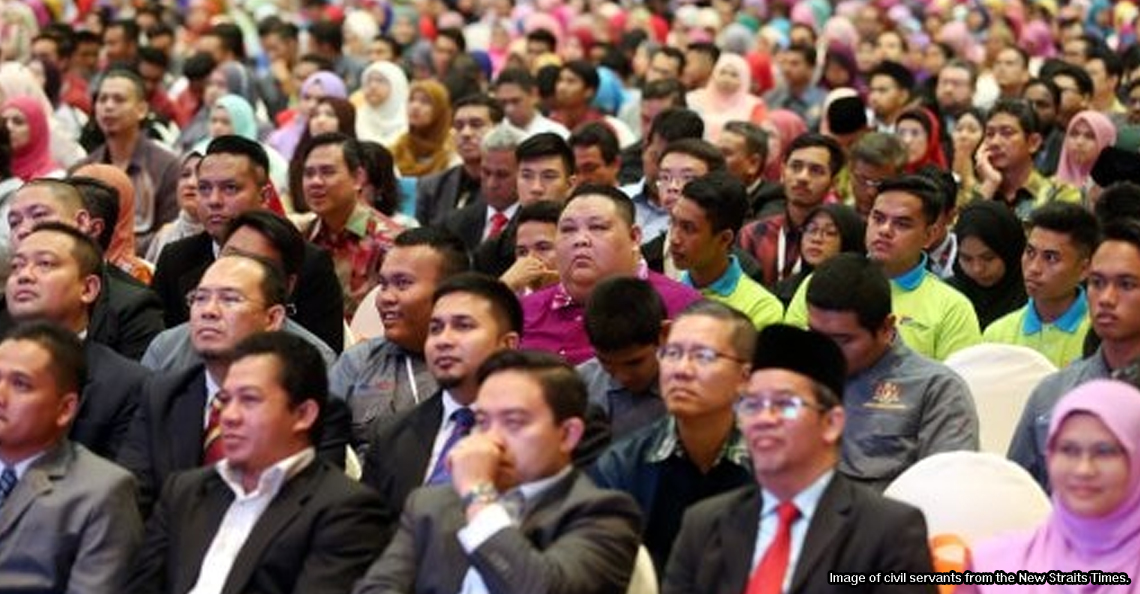
- 2.4KShares
- Facebook2.1K
- Twitter40
- LinkedIn41
- Email56
- WhatsApp129
[This article was originally published in March 2018.]
We’ve heard a lot of talk about Malaysia’s civil service in recent years, mostly about them being bloated (not literally, but then again…) or about them being made up of a single race. We’ve written about the size of our civil service before, so why not talk about the second thing this time? We may fondly remember some of our teachers in school being non-Malays, but excluding them…
While they are as rare as good Malaysian movies, based on numbers, we do have civil servants who are not Bumiputras. Even discounting the police force, the military and teachers, non-Bumiputra civil servants exist in other gomen agencies. In his blog, Lim Kit Siang quoted the proportion of non-Bumiputras in the civil service as of the end of 2009 to be only 14%.
This is quite a small amount, so for several years already, the government have been trying to get more non-Bumiputras to apply for government positions, so that the civil service is more balanced ethnically.
So how come we see so little of them today? Before we start pointing fingers, the first thing you should know about getting a job as a civil servant (hereafter referred to as ‘gomen jobs’) is that…
Getting a gomen job is notoriously difficult in Malaysia

The most common way to get a gomen job in Malaysia now is through the Suruhanjaya Perkhidmatan Awam (SPA), which is an agency that functions like the government’s HR department. Except for special cases, like the soldiers and teachers, the SPA holds interviews for most government positions. This ranges from the lady behind the counter at the public library to the director of a state’s wildlife department. They also handle relocations, promotions and disciplinary measures, to name a few.
Anyway, people aiming for a gomen job will register themselves on the SPA website and apply for the positions they want, according to their qualifications. Then they wait… and wait some more, until there are positions open. The SPA will then contact the relevant applicants for an interview, but for some positions, there are extra hoops to jump through even before that, like an online test and/or a physical test.

Passing all that grants you an interview, and if you manage to go through all of these ordeals with flying colors, you’ll land yourself a sweet, stable, easy job with a pension plan. It sounds pretty difficult, so you might be wondering how many actually made it each year. We’ve mucked around on SPA’s website, and found some statistics from 2011 to 2015 that may answer that.
For these five years, on average 1.5 million Malaysians applied for a gomen job, but only around 200,000 get called to an interview. That’s only 13.7% of the applicants. Of that number, only one-fifth got hired, or around 40,000 people. Overall, from the beginning to the end of the process, 97.3% of all applicants were rejected. Yikes.
While the hiring process nowadays are said to be based on merits, in applying for a gomen job…
… Chinese people have the highest success rate in their interviews!

The data we got for 2011-2015 actually comes in four sets:
- the number of people who applied
- the number of people called for interview
- the number of people who showed up, and
- the number of people who landed themselves a gomen job… all of them segregated by race and year.
So it’s possible to find out which race had the highest success rate by comparing the numbers. First, in getting called for an interview…
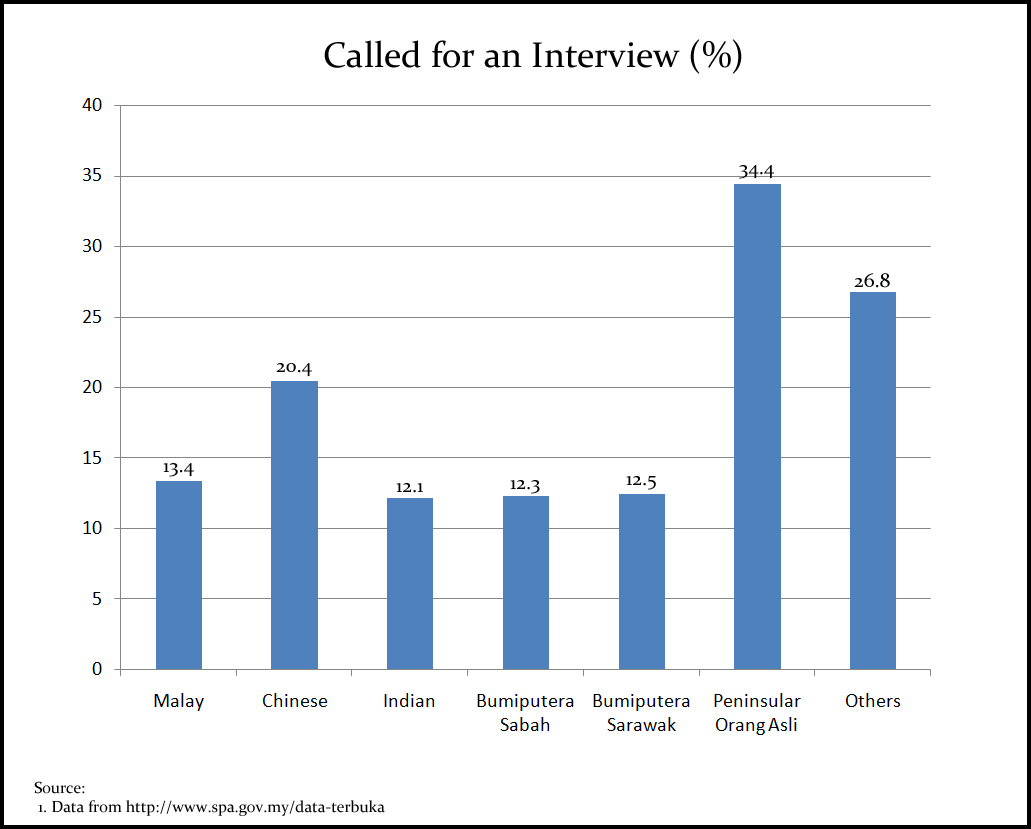
…it would seem that Orang Asli applicants have the highest rate of being called. Discounting the ‘others’, the second most likely to be called are the Chinese. Now, if you think that it’s just because we have four separate categories for Bumiputras, we tried combining them together into one single category, and the rate is still 13.33%. Applicants of Indian descent are the least likely to be called for an interview, but not by much. As for actually passing the interview and getting a job…

…if you didn’t count the ‘others’, Chinese applicants are the most successful, with more than half of them passing the interviews and getting a job.
They are followed by the Indians, and the Bumiputras rank at the bottom four. This may be strange, considering that all you see in government agencies are Bumiputras, but the reason behind this may be due to proportion.
Bumiputras outnumber the other races in applying for gomen jobs, and there’s a reason behind that
On average, for every 100 Bumiputras that applied through the SPA, only 8 non-Bumis did the same. Of course, this would mean that despite non-Bumis having a higher passing rate in their interviews, they’re still the minority in the civil service.
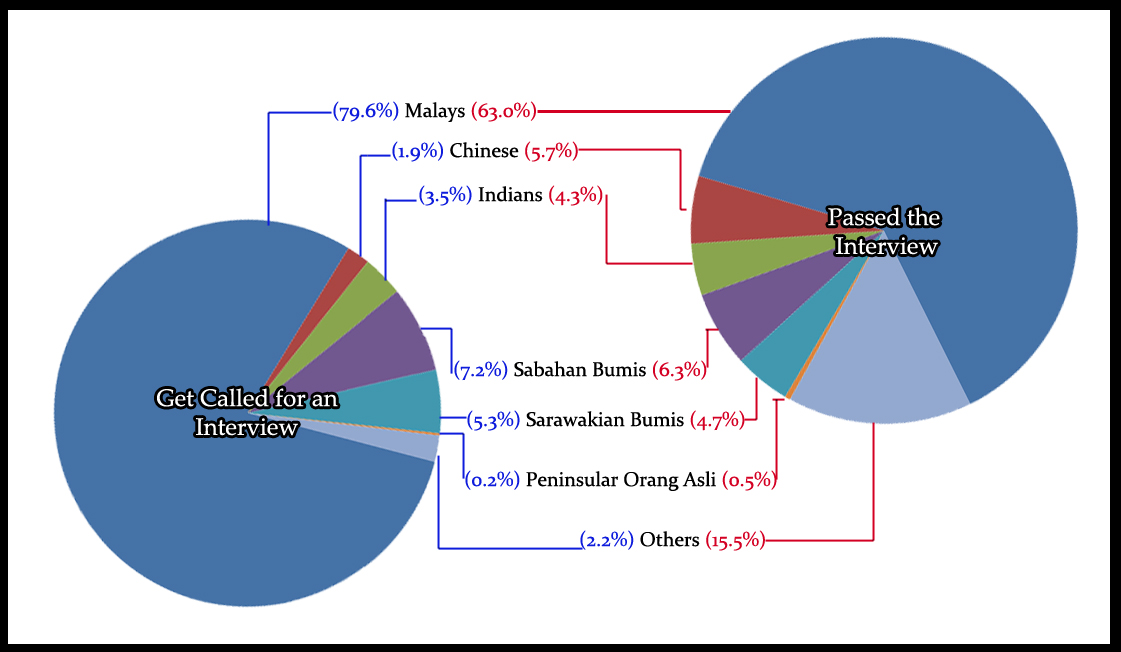
While some may say, “Well, duh. There are more Bumiputras in Malaysia anyways, so of course they’re the majority,” the reality is that Malays are still heavily over represented, meaning that the percentage of Malays in the civil sector is more than the percentage of Malays in Malaysia.
In a paper by the Center for Public Policy Studies in 2005, they compared the percentage of a certain race in the civil sector against the race’s total percentage in Malaysia, and they came up with a representative index to reflect that. An index of 1.0 is perfect representation, while higher or lower than that denotes over- or under-representation, respectively.
While other races are severely under-represented (Chinese – 0.36, Indians – 0.69, other Bumiputras – 0.66), the index for Malays went the opposite direction, being an average of 1.44. The over-representation gets more severe the higher up the chain of management you go: in the Top Management Group, the over-representation reached 1.57.

But why are there so little non-Bumi applicants in the first place? Perhaps, as proposed by a USM study, there are different perceptions on a public sector career among Malaysians. For example, as stated by the study, there are pull factors (reasons to choose) and push factors* (reasons not to choose) at play in influencing fresh graduates to take up a gomen job. Among the pull factors stated include:
- job security
- fringe benefits
- fixed working hours
- low job stress
- sufficient pay
- good promotion prospects
- many holidays
Push factors, on the other hand, include
- unattractive pay
- poor promotion prospects
- job not interesting or challenging
- poor image
- low autonomy
- high work load
- poor working environment
You might have noticed that some of the factors contradict each other. How can the same job have both good and bad promotion prospects at the same time? Well, the study recognized that it depends on who you ask. One-sixth of the non-Malay respondents cited poor promotion prospects as a push factor, while none of the Malay respondents said that. This is said to be due to a perception that non-Malays are discriminated when it comes to promotion.

Along with the relative rigidity of the salary scheme compared to the private sector, discrimination is the main reason non-Malays avoid working in the public sector. There’s even a rumor some time back that non-Malay applicants to the public sector had their application forms torn up. Despite the incident being just a rumor, it was taken quite seriously by some people, which in some way showed how deep-seated the perception of discrimination is.
You may remember the same theme from one of our previous articles, where we asked some veterans why non-Malays are reluctant to join the military. In case you didn’t remember, the military faced the same issue of not having enough non-Malays in the force, and fear of discrimination was the main issue.
So what have the government been doing to combat this?
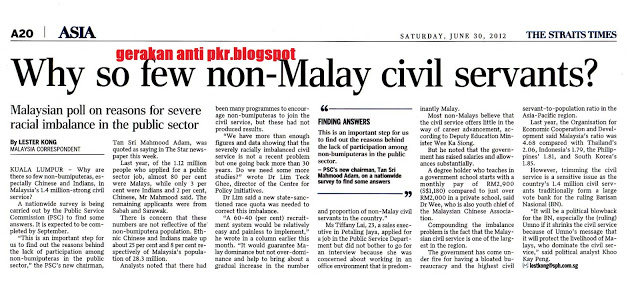
Earlier in the article, we’ve mentioned that the government (specifically, the SPA) had been trying to get more non-Bumiputras to join the civil sector, but what have they been doing?
For one thing, back in 2012 the SPA tried to station non-Bumiputra gomen workers at the counters and front desks of government agencies. Besides increasing service effectiveness for different races, it also aimed to attract non-Bumis to apply for a government job. However, judging by the lack of non-Bumis manning the counters, perhaps it didn’t work.
Besides that, the SPA also tried approaching the Chinese and Indian communities in dialogue sessions to tell them about their opportunities in the public sector, as well as increasing the amount of positions they can apply for from 5 to 15 and advertising those in Tamil newspapers. It would seem that their efforts worked somewhat, as in the latter half of the following year, applications from non-Malays increased by more than 70%.

However, perhaps a bigger problem, the perception of discrimination towards the non-Malays, remained unsolved. Ramon Navaratnam, a Malaysian economist, had noted in his book that “practically all Secretaries-General of Ministries and Directors-General of professional departments are Bumiputras“, and that the same is true for their deputies. He also noted that almost all senior officials in our public universities, from school deans upwards, are also Bumiputras.
This simple observation may be a factor in the widespread perception that Malays are given preferential treatment in promotions and preferred postings.
“If they do not see equal opportunities in their career, they might decide against applying for jobs in the public sector to avoid feeling frustrated.” – R. Navaratnam, retrieved from CPPS.
While the government had often cited that the reason many non-Malays aren’t interested in joining the civil service is the low pay, independent analysts believe that unequal treatment of personnel, particularly in regard to promotions, is also an important factor. So until we see more non-Malays in the top management positions or the front lines of the civil service, the public’s perception towards the civil service probably won’t change by much.
- 2.4KShares
- Facebook2.1K
- Twitter40
- LinkedIn41
- Email56
- WhatsApp129

